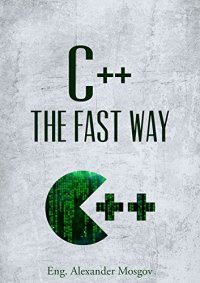Do you want to break into Programming and make more money?
Do you need to broaden your skills into C++ programming?
Do you want to know what CPP programmers are talking about?
If you answered ‘yes’ to any of these questions, then C++: The Fast Way is a fantastic place to start your lucrative journey into the world of programming by teaching you one of the most in-demand programming languages.
What few people have fully explained is that programming isn’t only for those with degrees in computer science or engineering. Programming is for anyone who likes to solve problems or create totally new products, and isn’t afraid to learn how to use some code to get there. You don’t need a college degree or a lot of expensive software. With this book and a computer, you are on your way!
This book covers the most basic and important aspects of C++, and many of these fundamentals apply to many other programming languages as well, so don’t be surprised if, after a careful reading of this book, you can follow along with what the people in IT are saying in the staff meetings for the first time.
We start off with data types, or the digital ‘material’ we will be conveying to our users once we start writing our code. Then we will move into simple operators and expressions, and gradually move into more complex operator and expression concepts. The beauty of this book is that you can study these foundations at your own pace, always at just the right speed!
Next, we will learn the logical steps our program needs in the chapter entitled ‘Decision Making Statements’. This is where you will start to see the real C++ ‘magic’ happen, except you will start creating some of this magic yourself. You will also be learning the logical foundation of thought that goes into every successful app out there, regardless of language or platform.
In the next chapter, you will learn to write your own classes with the knowledge you now have of the basics of the C++ programming language, and how to use the objects you create. In this lesson, you will find information about defining your own classes, including declaring member variables and methods.
Once you understand methods, we will take the methods concept a little farther in the next chapter on ‘Constructors’, which are a very specific type of method used to hone your projects’ strength.
In the final chapter, ‘Interfaces’, we will learn what a C++ interface is (an abstract type used to designate a set of abstract methods for classes to implement. When a class implements an interface, it must inherit all of the abstract methods declared within, similar to someone signing a contract and carrying out the agreement), how to use it, and provide a C++ interface example for reference.
This most exciting thing about the book, is that once you study it entirely, you will be speaking fluent C++ with developers of just any any skill level – a valuable workplace skill even if you are not in All-Microsoft environment!





